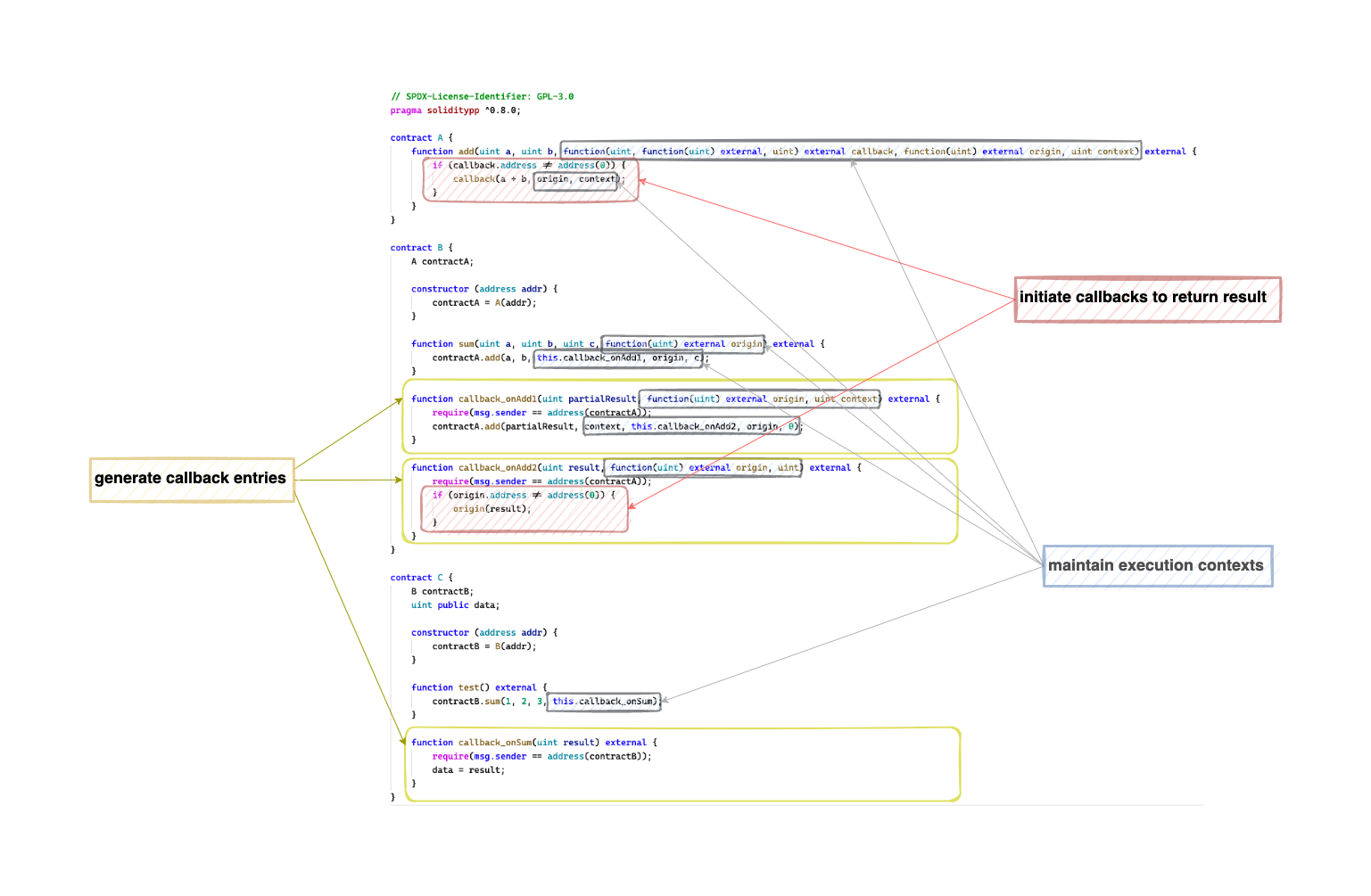Vite VM
Vite VM (Virtual Machine) retains the semantics of most EVM instructions, but is not a clone of EVM. Therefore, new instructions such as synccall and callbackdest need to be implemented from scratch, and some EVM instructions such as return, returndatasize, returndatacopy need to be reimplemented to adapt to the Vite protocol.
Transaction Types
Three new transaction types are added in Vite VM:
- SendSyncCall: A send transaction initiated by a synchronous call,
- SendCallback: A send transaction initiated by a callback that successfully executes and returns a result.
- SendFailureCallback: A send transaction initiated by a callback that fails to execute and returns an error.
Execution Context
Each transaction with one of the three new types contains an execution context data stored in the database.
The execution context is defined as follows:
For a SendSyncCall transaction, its execution context includes:
- referrer holds the send transaction hash of the upstream (origin) sync call.
- callback holds the 4-bytes method id of the callback function entry.
- stack holds a snapshot of the contract stack at the time synccall is executed.
- memory holds a snapshot of the contract memory at the time synccall is executed.
For a SendCallback or a SendFailureCallback transaction, its execution context only includes a referrer field:
- referrer holds the send transaction hash of the latest sync call.
Note:
referrercould look a bit confusing, see the example below:

SyncCall Instruction
The synccall instruction is implemented in pseudocode as follows:
func opSynccall() {
callback, toAddress, tokenID, amount, inOffset, inSize := vm.stack.pop(6)
calldata := vm.mem.get(inOffset, inSize)
if vm.Context.originSendBlock == nil {
// upstream call
origin := this.sendBlock
} else {
// load origin from VM context, it was saved by previous callbackdest
origin := vm.Context.Origin
}
tx := ViteRequestTransaction {
from: this.address,
to: toAddress,
type: SendSyncCall,
value: amount,
token: tokenID,
data: calldata
executionContext: ExecutionContext {
referrer: origin.Hash,
callback: callback,
stack: vm.stack,
memory: vm.memory,
}
}
vite.trigger(tx)
}
Return Instruction
The return instruction is implemented in pseudocode as follows:
func opReturn() {
offset, size := vm.stack.pop(2)
ret := vm.mem.get(offset, size)
sendType := this.sendBlock.BlockType
// need to trigger a callback transaction
if sendType == SendSyncCall || sendType == SendCallback || sendType == SendFailureCallback {
// get the send-block of the original call
if vm.Context.Origin == nil {
// the return statement is not in a callback function
// so origin is the latest send transaction
origin := this.sendBlock
} else {
// the return statement is in a callback function
// load origin from VM context, it was saved by previous callbackdest
origin := vm.Context.Origin
}
if origin.BlockType == SendSyncCall {
callback := origin.executionContext.callback
// calldata of the callback: [callback_id][return_data]
data := concat(callback, ret)
tx := ViteRequestTransaction {
from: this.address,
to: origin.address,
type: SendCallback,
data: data,
executionContext: ExecutionContext {
referrer: origin.Hash,
}
}
vite.trigger(tx)
}
}
}
CallbackDest Instruction
The callbackdest instruction is implemented in pseudocode as follows:
func opCallbackDest() {
sendType := this.sendBlock.BlockType
if sendType == SendCallback || sendType == SendFailureCallback {
referrer := this.sendBlock.executionContext.referrer
// validate sync call send block
if referrer.address != this.address || referrer.ToAddress != this.sendBlock.address {
return nil, error
}
// get upstream origin send block
origin := referrer.executionContext.referrer
// validate origin send block
if origin.ToAddress != this.address {
return nil, error
}
// save origin send block to VM context
vm.Context.Origin = origin
// restore stack
vm.stack = referrer.executionContext.stack
// push success flag (act as RETURN instruction in EVM)
if sendType == SendCallback {
// push true
stack.push(1)
} else { // sendType == SendFailureCallback
// push false
stack.push(0)
}
// restore memory
vm.memory = referrer.executionContext.memory
}
}
Advanced example
Show
### Objectives  ### Solidity Compiler and EVM Pseudo assembly code for contract `A`:function_selector:
method_id := calldata(0, 4)
if method_id == sig_hash(add)
jump(tag_function_add)
else
fallback()
stop
tag_function_add:
a, b := abi_decode(calldata)
tmp := checked_add(a, b)
ret := abi_encode(tmp)
return(ret)
function_selector:
method_id := calldata(0, 4)
if method_id == sig_hash(sum)
jump(tag_function_sum)
else
fallback()
stop
tag_function_sum:
a, b, c := abi_decode(calldata)
contract_address := contractA
method_id := sig_hash(add)
params := abi_encode(a, b)
call(contract_address, method_id, params)
partialResult := abi_decode(returndata)
params := abi_encode(partialResult, c)
call(contract_address, method_id, params)
ret := abi_decode(returndata)
return(ret)
function_selector:
method_id := calldata(0, 4)
if method_id == sig_hash(test)
jump(tag_function_test)
else
fallback()
stop
tag_function_test:
contract_address := contractB
method_id := sig_hash(sum)
params := abi_encode(1, 2, 3)
call(contract_address, method_id, params)
ret := abi_decode(returndata)
data = ret
return
function_selector:
method_id := calldata(0, 4)
if method_id == sig_hash(add)
jump(tag_function_add)
else
fallback()
stop
tag_function_add:
a, b := abi_decode(calldata)
tmp := checked_add(a, b)
ret := abi_encode(tmp)
return(ret)
function_selector:
method_id := calldata(0, 4)
if method_id == sig_hash(sum)
jump(tag_function_sum)
else if method_id == 0x00000001
jump(tag_callback_01)
else if method_id == 0x00000002
jump(tag_callback_02)
else
fallback()
stop
tag_function_sum:
a, b, c := abi_decode(calldata)
contract_address := contractA
method_id := sig_hash(add)
params := abi_encode(a, b)
callback_id := 0x00000001
synccall(contract_address, method_id, params, callback_id)
stop
tag_callback_01:
callbackdest
p := abi_decode(calldata)
contract_address := contractA
method_id := sig_hash(add)
params := abi_encode(p, c)
callback_id := 0x00000002
synccall(contract_address, method_id, params, callback_id)
stop
tag_callback_02:
callbackdest
ret := abi_decode(calldata)
return(ret)
function_selector:
method_id := calldata(0, 4)
if method_id == sig_hash(test)
jump(tag_function_test)
else if method_id == 0x00000001
jump(tag_callback_01)
else
fallback()
stop
tag_function_test:
contract_address := contractB
method_id := sig_hash(sum)
params := abi_encode(1, 2, 3)
callback_id := 0x00000001
synccall(contract_address, method_id, params, callback_id)
stop
tag_callback_01:
callbackdest
ret := abi_decode(calldata)
return(ret)